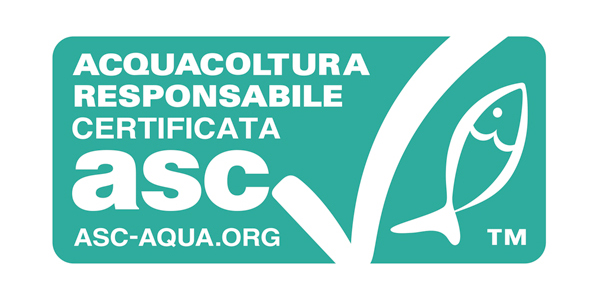
CERTIFICAZIONE ASC™ – Aquaculture Stewardship Council™
Aquaculture Stewardship Council™ (ASC™) is an international, independent and non-profit organization, created with the aim of developing and managing a certification program for responsible aquaculture.
The ASC certification is the main certification scheme for responsible aquaculture internationally. The ASC certification program is based on standards that establish stringent requirements that encourage fish farms to minimize the major environmental and social impacts of aquaculture. The current 11 ASC standards cover 17 groups of fish species: abalone, bivalves (clams, mussels, oysters, scallops), flat fish, freshwater trout, pangasius, salmon, sea bass, sea bream, lean, yellowtail and cobia, shrimp, tilapia, and tropical sea fish. There is also a joint ASC-MSC standard for algae. There is also a joint ASC-MSC standard for algae.
ASC chain of custody system guarantees the traceability of fish products along the entire handling, processing and distribution chain of the product. All companies in the chain intending to handle or sell ASC certified products must have Chain of Custody certification. ASC (for responsible aquaculture) and MSC (for sustainable fisheries) certification schemes share the same chain of custody standard. This allows companies to manage a double certification in a convenient and practical way by following the rules of a single Standard.
Thanks to the chain of custody, the final product can be labelled and consumers can choose responsibly farmed fish products with the ASC logo.
ASC sets standards for the industry to meet, including environmental and social goals that fish farms must meet in order to become certified and be able to bear the ASC logo on their products However, the ASC has no role in the certification process, which is a third-party system. Vireo is an independent certification body accredited by ASI (Assurance Services International) to conduct audits and issue ASC certificates (ASI-ACC-086).
FAQ
How long does an ASC certificate last?
ASC certificates are valid for 3 years with an annual inspection.
What is the certification process like?
When the company is ready, Vireo plans a first certification audit (Main Assessment). In this phase all the information is collected and, if everything is in order, the certificate is issued a few days later. The company must indicate the ASC certified fish species and the certified suppliers that have been identified.
WHAT ARE THE MAIN ASPECTS OF THE Chain of Custody STANDARD?
The Standard consists of five principles.
- Certified products must be purchased from certified suppliers
- Certified products must be identifiable
- Certified products must be kept separate
- Certified products must be traceable and volumes must be recorded
- The organization must have a management system.
The main aspects are registration (traceability) and correct identification and separation.
Which businesses need certification?
All enterprises who acquire legal ownership of the ASC product, even without physical possession, and want to resell it as such should be certified. Some specific exceptions to this general rule are described in the MSC chain of custody standard. In this case, however, the certified organization cannot promote ASC products.
Are the MSC Standard and the ASC Standard the same?
Yes, both MSC and ASC schemes share the same chain of custody standard. Companies can therefore opt for a dual MSC and ASC certification.
Is there a cost associated with using the MSC brand?
Yes, there is a cost to using the ASC brand. Management is the responsibility of MSC International. The relevant criteria for being able to use the logo can be found on the ASC International website, whereas the costs can be found on the page“Cost to use the MSC label”.
Chain of custody standard
The MSC and ASC chain of custody certificationguarantees the traceability of MSC certified seafood products. It is based on a Standard of traceability and segregation that is applicable to the entire production chain.
Chain of custody is based on some general aspects such as:
- The definition of roles and responsibilities,
- verification of MSC or ASC raw material supplies
- Proper segregation of raw material in the warehousing stages and in the processing and manufacturing stages
- Records management (input quantities, processed, transformed, etc.)
- sale and labeling of finished product
The focus of certification is therefore to pursue the non-mixing of MSC or ASC product with non-certified product.
Chain of Custody MSC and ASC certificates are valid for 3 years. During this period, the performance of companies must be examined to see that they continue to meet the MSC and ASC Standards. After 3 years the company must be completely reexamined if it wishes to remain in the MSC and ASC program.
Only certified companies can put the MSC or ASC mark on certified products and also use it for promotion. The MSC and ASC logos are registered trademarks whose use is granted, subject to payment of fees, by MSC International.
The MSC label on the product means that the fish comes from sustainable fisheries, while ASC-labeled products come from responsible fish farms.
Downloads

MSC CHAIN OF CUSTODY STANDARD (VERSION 5)

MSC CERTIFICATION PROCESS GUIDELINE (EN)

DISPUTES AND CONFLICTS PROCEDURE – COMPLAINTS AND APPEALS PROCEDURE
TESTIMONIES
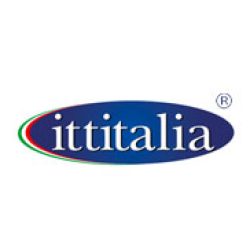
ITTITALIA SRL
MSC and ASC certifications for Ittitalia means giving consumers greater awareness in choosing the seafood they buy. Thanks to Vireo we are taking the first steps to be able to achieve this goal. For us, Vireo stands for professionalism, competence, courtesy and helpfulness of the staff.
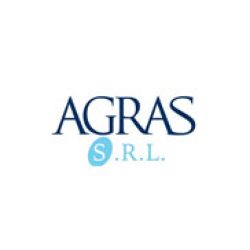
AGRAS SRL
We met Vireo in 2013 when we were among the first in Italy to believe in MSC certification. Since then helpful and competent professionals have been certifying our company in the MSC chain of custody.
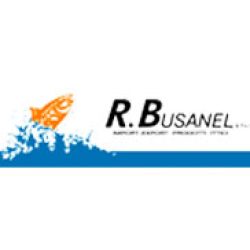
R.BUSANEL & F.LI SRL
We are very satisfied with the cooperation with Vireo, with whom we prepared and obtained MSC and ASC certifications in a short time, thus giving prompt response to market needs.
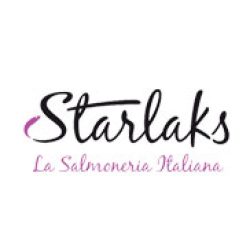
STARLAKS ITALIA SRL
We began working with Vireo to achieve MSC chain-of-custody certification. Now we have again chosen Vireo’s expertise and professionalism to obtain ASC certification. Highly competent staff, professional and available for clarification or insight.





